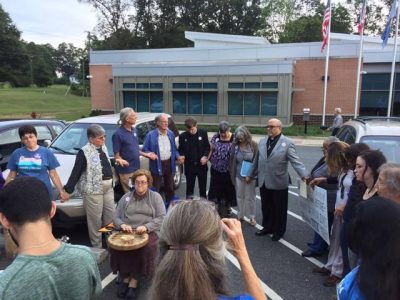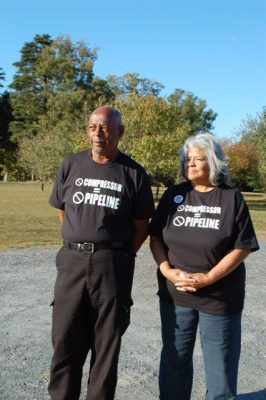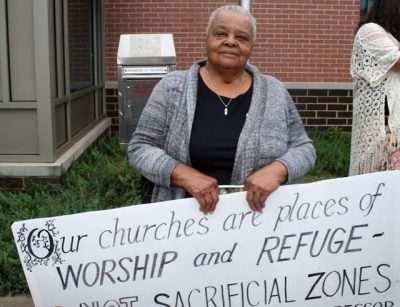 Special to the Front Porch: Our guest today is Lakshmi Fjord, a Visiting Scholar in Anthropology at the University of Virginia who lives in Charlottesville and owns property in Yogaville in Buckingham County, Va., where a giant compressor station would be built as part of the proposed Atlantic Coast Pipeline.
Special to the Front Porch: Our guest today is Lakshmi Fjord, a Visiting Scholar in Anthropology at the University of Virginia who lives in Charlottesville and owns property in Yogaville in Buckingham County, Va., where a giant compressor station would be built as part of the proposed Atlantic Coast Pipeline.
- A People’s Tribunal on Environmental Justice and Fracked Gas
- October 28, 11:45 a.m. to 7 p.m., City Space, Charlottesville
- Featuring nationally acclaimed community activist Lois Gibbs, environmental attorney and toxicologist Adrienne Hollis, and anthropologist of indigenous and environmental justice James Igoe.
In 1979, I was one of the founding members of Yogaville, a spiritual community and retreat center in Buckingham County, Virginia, where we purchased 640 acres with a mile of James River frontage, three springs, Blue Ridge Mountain vistas, and pure air, water and soil. Its rural nature made it an ideal retreat and yoga education site.
At the time, Buckingham County was 65% African-American and the lowest-income county in Virginia. In this rural county at the exact center of Virginia, I witnessed every day the legacy of plantation slavery that still holds sway. Descendants of former slaves and descendants of plantation owners with the same last names live on either side of the color line on the same lands where their ancestors had been slaves and masters.
I became involved in local black communities and learned that it was taboo to speak about “the old times” (slavery) or to voice publicly that the racial discrimination at every level of socioeconomics, culture and politics was “racism.” It is hard for us outsiders to fathom how ingrained self-protectiveness must be if one lives where relatives were held in bondage and brutally punished since the 1600s. Few outsiders are told about the various forms of retribution still taking place against local African-Americans who name racial discriminatory actions as such. This is what occurred when Dominion Resources set its sights on Buckingham County a few years back for what would be the sole compressor station in Virginia for its multi-state proposed Atlantic Coast Pipeline (ACP).
Dominion Resources is the parent company of Dominion Energy, the public utility monopoly in Virginia. Dominion Energy provides neither gas service nor electricity to most of Buckingham County because it’s unprofitable to do so in such a rural area. (An electric cooperative provides the service.) Yet, this is the site Dominion chose to build a huge, highly polluting propulsion and storage facility to transmit volatile fracked natural gas at extreme pressure over 200 miles in each direction. The company secretly purchased 68 acres of land with a large wetland from descendants of plantation owners at 10 times the market value in the middle of Union Hill, a historic Freedmen community. And now, those heritage lands owned by Freedmen descendants that have tied their generations to this land and place have lost most of their value.
After the veil of secrecy was lifted and we learned the intent of the purchasers, concerned residents formed Friends of Buckingham to protect and preserve the people and natural resources of the county and to work for clean, sustainable energy sources instead of outdated, toxic-producing fossil fuel development.
For the past three years, the focus of my volunteer advocacy with Friends of Buckingham has been to research and document evidence to counter the blatant omissions in Dominion’s documents of required information on population, historic cultural resources, water and geo-hazards of the Union Hill site. Those documents include Dominion’s applications to the Federal Energy Regulatory Commission, to Buckingham County for a special use permit, and to the Virginia Department of Environmental Quality for an air permit to allow toxic pollution.
Who are the people of Union Hill and what unique harms do they face?
To piece together the evidence of black history in Buckingham County for public comments and hearings, I oversaw our door-to-door survey of 99 households located within one mile of the site, researched historic blogs and the Special Collections library at the University of Virginia, and relied heavily on the research of Charles White in Confederate records and Smithsonian files. I applied for and we received “Most Endangered Historic Place” listing by Preservation Virginia in 2016 due to the proposed ACP, and collaborated with the organization to apply for historic register nomination by the Virginia Department of Historic Resources.
We learned from these combined efforts that the population of Union Hill is five times greater than what Dominion reported to FERC. Union Hill’s actual population qualifies it as a “suburban” neighborhood under the federal government’s pipeline safety standards. This means that Dominion must apply more safety measures on the pipeline in Union Hill, including using thicker pipes and installing shut-off values closer together. But Dominion’s documentation makes no change from its construction plans for rural areas, with thinner pipes and farther distances between the shut-off valves. The higher standards would be especially critical in Buckingham County, which has a 120-year history of earthquakes. It was the epicenter of the August 2011 quake registering 5.8 on the Richter scale that was felt up and down the East Coast, and the center of two quakes registering 2.3 just this year.
Union Hill is 85% African-American, one-third of whom are descendants of Freedmen. We learned they are disproportionately elderly and children – the result of young adults migrating to more “equal opportunity” urban centers, leaving their children in the care of their grandparents, and, in their words, “the clean air, water and quiet of Union Hill.” The residents rely on single-source aquifers for individual well water that would be next to a massive underground natural gas network of huge pipelines under extremely high pressure where the ACP would connect with the existing interstate Transco pipeline.
Most hazardous to the community would be the “blow-downs” – deliberate or accidental release of toxic emissions because of too much pressure in the compressor system. A recent study by Southwest Pennsylvania Environmental Health Project has conclusive evidence of a range of health impacts from exposure to the “toxic cocktail” of fracked-gas chemicals from blow-downs at compressor stations one-fifth the size of the one proposed here. Union Hill has higher than average air quality due its remote and largely agricultural characteristics. Under state regulations, the pure air quality perversely allows Dominion to emit toxic pollution at higher rates at its proposed compressor station, thus punishing those living as close as 150 feet on all sides for being good stewards of their heritage lands. This exemplifies the cost-benefits of racism in Buckingham County and Virginia.
These erasures of the Virginians who would bear the disproportionate impacts of the ACP’s fracked-gas infrastructure echo the erasures of records of enslavement (wills, Freedmen purchases of freedom that named owners’ names) when vigilantes burned down the Buckingham County Courthouse in 1869 following a committee vote in the U.S. House of Representatives for the 15th Amendment giving former slaves the right to vote.
Both erasures are meant to deny these Virginians federal legal protections, as well as to deny restitution for life-long harms directly caused by those who profit by exploiting African-Americans’ natural resources — in their persons under slavery, and now their clean air, water and soil.
A People’s Tribunal on Human Rights and Environmental Justice Impacts of Fracked Gas Infrastructure
Why now and what for?
On August 12, in Charlottesville, I was a nonviolent witness to extremist, white supremacist violence perpetrated in the name of preserving Virginia’s heritage of slavery in its monuments — monuments the persons honored explicitly did not want for the role they played in the Civil War. I witnessed the decision by Virginia State Police in riot gear to stand down, to not protect Charlottesvillians from mace, tear gas, guns, and a car used as a deadly weapon.
The purpose of the People’s Tribunal is to bring together pipeline-related testimonies from across Virginia, West Virginia and North Carolina impacted by the ACP or the equally risky and unjust Mountain Valley Pipeline (MVP). We aim to document and record in one informative narrative the voices of the people most impacted by these proposed pipelines, the scientific data about pipeline hazards and impacts, and the economics showing the projects are not needed for any public good, making the communities’ forced sacrifices that much more egregious.
Our event on October 28 has evolved to be part of the Permanent Peoples’ Tribunal on the Human Rights Impacts of Fracking and also to serve our immediate public informational needs and for next steps organizing against the pipelines. It will follow a people’s tribunal format of testimonies presided over by judges who are experts in the fields of human rights, environmental justice and community impacts from toxic infrastructure:
Lois Gibbs: Founder of the Center for Health, Environment and Justice and renowned activist whose efforts in the 70s to force the cleanup of toxic waste in her community in New York led to the creation of the federal Superfund law and earned her the prestigious Goldman Environmental Prize. Gibbs founded the and remains at the forefront of environmental activism in the U.S.
Dr. Adrienne L. Hollis: Director of Federal Policy at WE ACT for Environmental Justice, in Washington, DC. Dr. Hollis is an experienced environmental toxicologist as well as an environmental attorney. She has worked with a number of community organizations and has a wealth of experience in environmental justice issues.
Dr. James Igoe: Associate Professor in the Department of Anthropology at UVa. He has conducted field research on biodiversity conservation, community-based development, and grassroots social movements in Tanzania, Pine Ridge, South Dakota, and New Orleans Louisiana. His work focuses on the intersections of indigenous social movements, environmental justice, and nature conservation.
These renowned civic leaders will listen to testimonies, ask questions, and at the close of will sequester themselves for an hour to write a statement with their joint conclusions and recommendations. While they meet, the rest of the participants will break into facilitated small groups to plan next steps to take together.
This will be live-streamed on our Facebook event page, audiotaped for podcasts, and videotaped for short and longer YouTube videos – and the entire testimony video will be sent to the Permanent Peoples’ Tribunal on Fracking.
The idea to hold the People’s Tribunal is my hoped-for means to bring to public awareness the link between that lack of local and state protection against white supremacist violence on that fateful day and the slow, steady violence to the African-American people of Union Hill from the 1720s right up to today. For this community, we hope the tribunal will make clear that the threats they face, as do all people directly impacted by the ACP and MVP, are losses of key basic human rights protections agreed upon and signed to uphold by the U.S. and all signatories to United Nations’ treaties and conventions — that is, the rights to health, to clean air, water and food, to public participation, and to protection from social losses to their communities.
By the same token, the U.S. National Environmental Policy Act requires that key environmental justice considerations are considered in new toxic polluting infrastructure to stop the disproportionate burdens of these risks and harms to minority and low-income communities. Such factors were not considered by FERC when approving the ACP and MVP.
Why is this event necessary to a just and civil society?

Pastor Paul Wilson of Buckingham County leads a prayer circle before a supervisor meeting on the proposed Atlantic Coast Pipeline
Environmental justice is in our tribunal title because a disproportionate number of communities living along the routes of both proposed pipelines exemplify the cost-benefits of environmental injustice. It is cheaper and less problematic for the pipeline developers to route these projects where people are rural (a high percentage have no internet or cell phone coverage), African-American, Appalachian and Native-American. Why? These are “expected losses” in U.S. society, where such racial and economic discrimination by corporate profit seekers is no longer shocking, nor mobilizing for the vast majority. These largely disenfranchised Americans have less access to public information, networking, the public debate and political power.
For more than three years, people along these routes have made every effort to participate in the public process by bringing their testimonies as evidence against their approval: Buckingham compressor station special use permit, public comments to FERC on its environmental study, the Virginia Department of Environmental Quality on the required state water permits, to their local elected officials and to the public.
Yet on Friday, October 13, in a closed-door session, FERC voted 2-to-1 to issue certificates for both the pipelines. In a dissent – extremely rare for FERC — Commissioner Cheryl LaFleur demonstrated the evidentiary and informational value of these comments by impacted landowners, economists, lawyers, scientists, and medical experts by using them as the bases of her dissent. For those on the ground opposed to these pipelines, her statement demonstrated not only the worth of this publicly submitted evidence, but its availability and applicability to FERC decision-making.
These pipeline fights have forged coalitions of allies across diverse geographies, races, ethnicities, and economic statuses while also causing cruel fissures in common bonds by pitting communities against each other when trying to move routes. All impacted people and community groups in such a long and harsh process face mental health issues of burnout and traumatic stress from threats hanging over us. Peer and group support is a key strategy to stay in the fight.
Which is why, following the testimony phase, when the judges write their statements, we will hold the next-steps organizing discussion that this cross-geography gathering will allow. After years of unremitting distress on individuals, families, and communities harassed by land agents to give up their property rights, facing threats of toxic air pollution, fires, and explosions, this tribunal is meant to join us together in person in solidarity.






Dominion just completed building a huge compression station near my home in Sullivanville NY. They paid off local loan planning boards with promises of huge tax incentives. The board nor the NYS Dept of Environmental Conservation listened to hours of testimony from community members, professionals and scientists from Cornell.
Dominion carefully selects poor rural areas with people who can ill afford legal representation. They are the lowest of the low, looking for the poor and disenfranchised to take advantage of.
I have completed a group of folk art paintings describing our community’s issues. It was shown at The Bennington Museum in Vermont and the Fenimore Museum in Cooperstown.